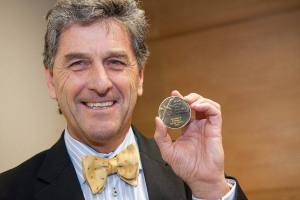The Dean’s Medal is presented for exceptional and sustained work in research, including research publications in high ranking national and international journals, and also recognises researchers making significant contributions to the Dunedin School of Medicine and the wider Otago University Health Campus research environment.
Prof Walker said the medal recognises of the work of many people, not only himself.
“This medal goes to a large number of people that I work with,” he says in crediting clinicians, pharmacists, those involved with both national and international trials, and people who worked in laboratories.
“This medal is a recognition of all these wonderful people, not just me.” he says.
Rob is not only a highly prolific research scientist (an author on 16 academic publications in the past two years alone) but also the Head of the Department of Medicine, a Clinical Nephrologist (kidney specialist) in the Southern DHB and a member of a number of national and international societies engaged in research on kidney function. His research focuses on kidney function and disease, ‘bench to bedside’, and ranges from studies of kidney development and physiology, to clinical investigations and trialing therapies, to prevention of kidney injury or in determining how to slow the progression of kidney disease.
As a newly qualified doctor, Rob became interested in nephrology from contact with the consultants he worked for in Christchurch, particularly the eminent nephrologist Ross Bailey who was very keen on clinical research.
This interest led to his first publication in 1982, reporting three different families in Christchurch with a form of kidney disease, not previously thought to have any genetic basis. He subsequently collaborated with colleagues in the USA, and from one particularly large family (of that group of three), the actual gene defect was identified.
“So that was a pretty cool progression of science from observation to identification,” Rob says.
Kidney disease is frequently called the ‘silent killer’ because of its gradual and insidious onset. In New Zealand, about one person in 11 has kidney disease with half unaware of their illness.
Kidney and heart function are linked. Consequently, patients with chronic kidney disease have a 3-to-5-fold higher risk of cardiovascular events while diabetic sufferers with chronic kidney disease have up to a 20-fold higher risk of early death. As the population ages and rates of those conditions rise, understanding how the aging kidneys handle and excrete medications is increasingly important.
In a recently published study, supported by a Foundation Laurenson grant, Rob showed that there are currently drug treatment inaccuracies as a result of how kidney function is measured with this potentially a major problem in people with complicating conditions such as diabetes.
In the future Rob’s discovery will help inform doctors on how to best prescribe medication for such patients, significantly improving clinical practice and drug effectiveness.
Rob says he has been extremely lucky to have both basic science (laboratory-focused) and clinical research interests and he thinks “it is the opportunity to continue as a clinician scientist that is the greatest part of this”.
He reiterated the importance of Foundation funding to his work with pilot studies not funded by large external funding bodies.
“The Otago Medical Research Foundation funding allows focussed studies on key areas of interest and the results of that research can then inform larger funding applications. Without funding from the Foundation, vital research might not be carried out.”
Key Kidney facts
• Your kidneys are two of the most important organs in your body.
• Each kidney is about the size of a mobile phone, found just under your back ribs, but you can’t feel them with your hands.
• They have an unusual shape – kidney beans are named after them because they have the same shape.
• The body’s entire blood supply gets filtered around 400 times in a day through the kidneys.
• Kidneys rid the body of waste products carried in the blood. They remove the minerals, vitamins and other nutrients that you get from your food, and anything not needed is made into urine.
• If the volume of fluid in your body goes down (maybe you are sweating out a lot of fluid through your skin or maybe you are not drinking enough water), the kidneys will not make much urine until the amount of fluid in your body goes up.
• The kidneys make a hormone that can constrict arteries causing blood pressure to rise and makes another hormone that tells the body when to make more red blood cells.
• The kidneys produce active vitamin D, which helps the body to absorb calcium from food.
You can look after your kidneys by:
• Drinking 6 – 8 glasses of water or other drinks (such as milk drinks or fruit juice) each day. Your kidneys like water best.
• Eating a healthy diet so that you get all the minerals and vitamins that your body needs.
• Staying away from tobacco and alcohol – these make the kidneys’ job more difficult.
